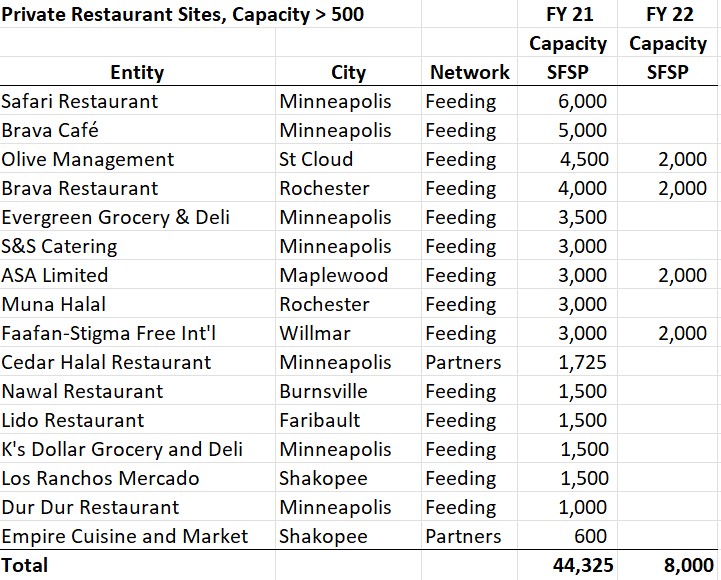The alleged Feeding Our Future scandal: how could it happen?
If, as the FBI claims, fraud indeed occurred in federal free food programs on an industrial scale, the fault lies in another agency: the U.S. Department of Agriculture (USDA).
In the early days of the pandemic, afraid that schools would be closed and unable to feed low-income children, the USDA waived dozens of regulations around their suite of child nutrition programs. The Child and Adult Care Food Program (CACFP) and the Summer Food Service Program (SFSP) specifically are designed to fill in the gaps around the better-known National School Lunch Program (NSLP).
Before the pandemic, the CACFP and SFSP were, for the most part, administered by schools and childcare facilities. Locally, the program was overseen on behalf of the Feds by the state Department of Education (MDE).
At the outset of the pandemic in March 2020, and for the duration, the Feds waived many program requirements. Key waivers included rules that had required on-site consumption of meals. That’s why you read about weekly distribution of bags of groceries containing multiple meals.
Further, children didn’t even have to be present. Parents or guardians could pick up meals without any accompanying children.
The original programs included strict requirements on what kind of locations could serve as food distribution sites. To broaden availability, any location — parks, apartment buildings, private restaurants, office buildings, warehouses, etc. — could distribution free food. Also, earlier restrictions that required distribution sites to be located in low-income areas were waived. The summer program was extended to run year-round.
As it turns out, the above waivers combined with the ending on-site inspections and requirements that all invoices be paid, even before sites were authorized, proved catastrophic. State agencies were told to “continue monitoring activities remotely.”
The lifting of restrictions allowing private restaurants to participate deserves a closer look. At first glance, with schools closed and population lockdowns in place during the early days of the pandemic, allowing restaurants to participate must have looked like a “win-win” for all involved.
Nonetheless, the applications of nine restaurants to participate in the program were denied by MDE in April 2020. The department relented by the end of the month and after that, it was off to the races.
Private restaurants with claimed capacities of more than 500 children per day, from MDE records and media reports:

Safari Restaurant, S&S Catering, and Empire Cuisine all had sites in the program in the summer of 2020, and are all accused by the FBI as being involved in fraud. Safari and S&S were among the entities whose initial applications were denied. In October 2020, those two were among six restaurants that MDE tried to expel from the program.
As the table above shows, MDE succeeded in preventing those three and many other restaurants from operating their own sites in the summer of 2021. Restaurants could (and did) continue to serve as food vendors to nonprofits that acted as site hosts. But the above table shows that there were exceptions.
Faafan Restaurant in Willmar served as the area location for Stigma Free International both years and continued into early 2022. Brava Restaurant, Olive Management and ASA Ltd. continued to serve in 2021, with listed capacities of 2,000 each. All four of these operated under the banner of Feeding Our Future
The Star Tribune recently profiled the role of Willmar’s Faafan Restaurant in the program. FBI search warrants document how the restaurant claimed to serve the maximum of 2,000 children for every day of both July and August 2021 in a city of just 21,000. The restaurant claims it was serving free meals, but declines to show invoices or any other records. The restaurant itself is not named in the FBI search warrants.
Even though the pandemic has ended, many of the federal waivers continue. The Department of Education is running out of time to ensure program integrity for the summer of 2022.